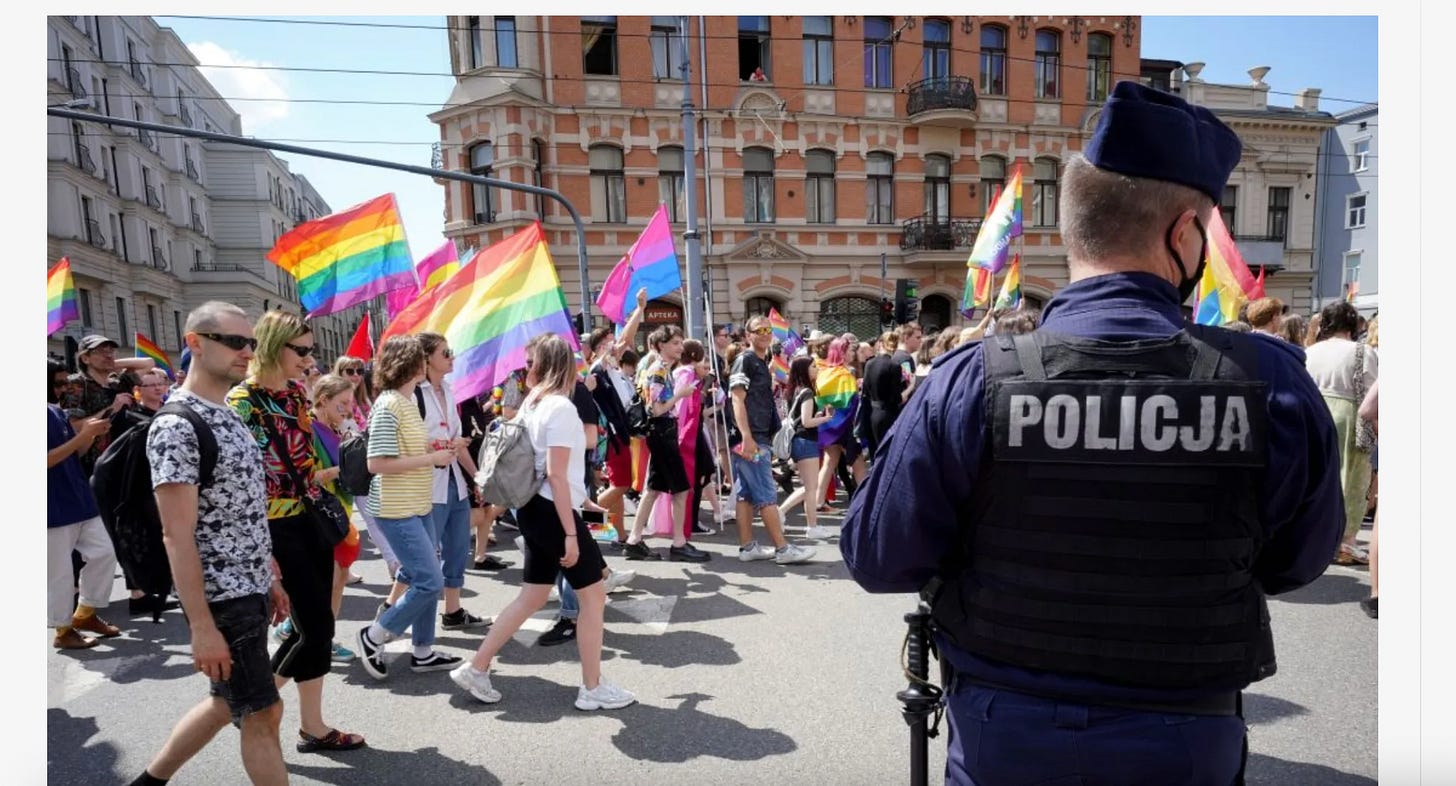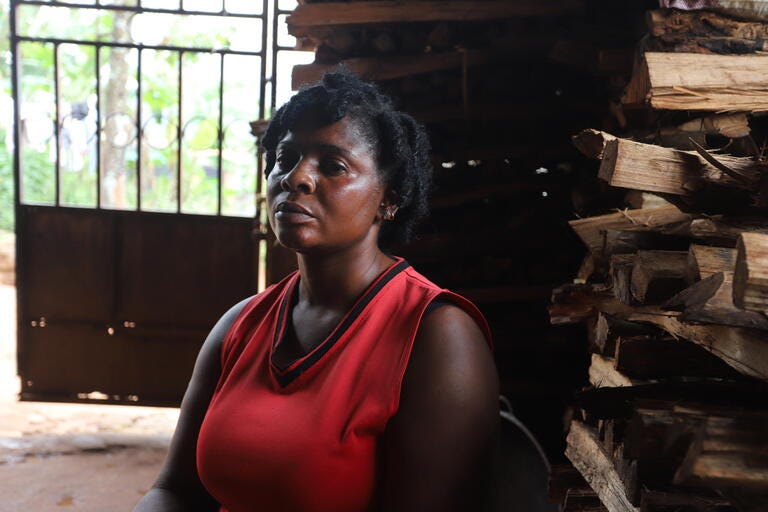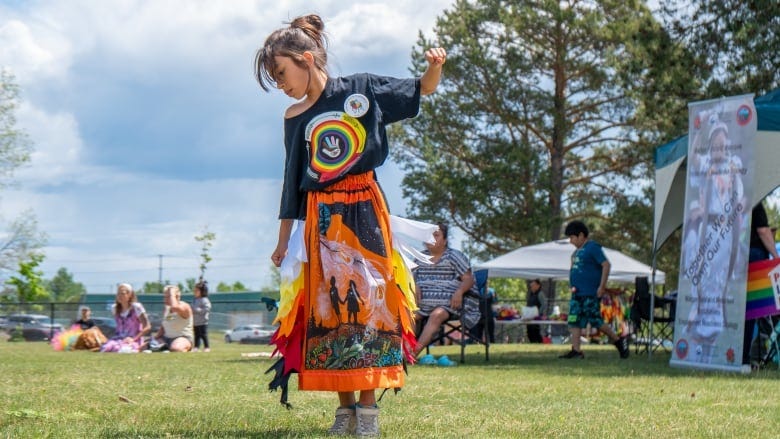Global Roundup: Poland LGBTQ+ Activists, US Abortion Rights, Cameroon Displaced Women, South Korea ‘Ajummas’, 2Spirit Powwow & Indigenous Pride
Curated by FG Contributor Samiha Hossain
Demonstrators take part in the Equality March in support of the LGBT community, in Lodz, Poland June 26, 2021. Marcin Stepien/Agencja Gazeta via REUTERS
A violent, homophobic attack led Mateusz Czyczerski to relocate from Poland to Germany in 2021. Czyczerski now lives in Cologne where he runs a support group for LGBTQ+ Poles who have also left the country. He is hopeful that a change of government in Poland will rein in the homophobia that played a large part in his decision to leave, but like many others in his community he is waiting for promised reforms to become reality.
At the time of the attack on Czyczerski, the nationalist Law and Justice (PiS) party was in power and was accused by critics of fomenting homophobia. In December last year, a pro-European government led by former European Council President Donald Tusk took over, and it has promised to bolster protections for LGBTQ+ people. The new government has pledged to make violence, threats or insults against people because of their sexual orientation, gender identity, sex, gender, age or disability into aggravated offences that carry heavier penalties. The proposed amendments to the Criminal Code could be voted on in parliament as early as this month. Tusk's government also promised to legalise same-sex civil partnerships in its first 100 days in office but it failed to meet that deadline, drawing calls from activists for swifter action.
LGBTQ+ Poles currently have limited legal options to challenge harassment or attacks. In Czyczerski's case, two of his three attackers were convicted of assault and robbery, but the court ignored the homophobia he says was responsible for the incident.
The proposed legislation would make an enormous difference. It would clearly signal that attacks on LGBTQ+ people are not random, that these people are targeted on the basis of specific characteristics. -Mateusz Wrotny, LGBTQ+ rights and privacy activist
While LGBTQ+ activists welcome the proposed legal changes, many fear they will not do enough to guarantee security. The training of police officers, prosecutors and judges will be crucial, Jacek Jasionek, a lawyer who works with Polish LGBTQ+ rights group Tolerado, and Wrotny, said. Furthermore, activists fear parliamentary debate on the proposals, due to begin in the near future, will prompt a new wave of homophobic rhetoric from hard-right MPs and ultraconservative groups.
Rev. Love Holt. Photo by Andrew Davis / NBC News
Abortion rights advocates say that women in the 21 US states that have banned or restricted abortion since the overturn of Roe v. Wade in 2022 increasingly fear that they will be prosecuted for using abortion pills. Last month, Louisiana became the first state to declare abortion pills dangerous controlled substances and to threaten jail or fines to anyone possessing them without a prescription.
If/When/How, a nonprofit national legal advocacy group that supports abortion rights said that its legal helpline recorded an 875% increase in calls in the six months after Roe was overturned, compared to the same time in 2021. Calls to the helpline — which assists people concerned about pregnancy outcomes — have continued to rise since then. The top question asked by callers was what are the legal rights and risks for people who take the abortion pills, the group said.
We are in a fearful climate with increased hostility and legal risk for patients, providers and helpers. We have to be prepared for the ongoing targeting and criminalization of people who are seeking abortion care. - Kelly Baden, Guttmacher Institute, vice president for public policy
Leaders of the mainstream anti-abortion groups say their goal is to not punish women who obtain abortions, but many of the new laws do target people who provide or assist in providing abortions. But abortion rights advocates and attorneys warn that women who are self-managing their abortions because of the shuttering of clinics are now at greater risk of being reported, investigated and prosecuted due to stigma, misapplication of the law and criminalization of abortion.
People are afraid. People are afraid to even seek information. Once a prosecutor decides that they want to punish someone for ending their pregnancy, they’re going to find a way to do so — they’re going to find a law that’s going to fit. - Farah Diaz-Tello, If/When/How, senior counsel and legal director
Like many people in states where abortion is illegal, the Rev. Love Holt knew she had to look beyond her state lines to get care. She attempted to make an appointment for a medication abortion in Illinois, but there was a four-week wait. Holt would need a surgical abortion by then, which would require more resources — like time off from work and money — which she did not have as a single working mother. It led her to order the pills online, which arrived about 18 days later, and Holt took them at home at 13 weeks and six days pregnant, despite it being recommended by the FDA no later than 10 weeks. Later, her mother found her passed out in her car and “covered in blood” and rushed her to the hospital.
Holt is grateful that she was able to self-manage her abortion — and get subsequent care at the hospital — without criminalization. But she said others, particularly women of color, haven’t been as fortunate when navigating the shifting abortion landscape. The experience drove her to decide to try to fight back politically at the state level. Together with Abortion Action Missouri and other reproductive rights groups, Holt helped gather enough signatures in May to advance a ballot measure that would enshrine abortion rights in the state constitution. Missouri is one of 10 states where organizers are hoping to put abortion rights in state constitutions through citizen-led ballot initiatives, according to the Guttmacher Institute.
We are able to sweep a lot of things under the rug in Black communities to just try to survive. But this is one that will not be swept under. And it will affect every one of us in a way. -Love Holt
Julien in her house. Photo: Patricia Pouhe/NRC
Julien is a 36-year-old single mother of four from Ndu in the Northwest region. She was forced to flee with her children due to unprecedented violence in 2020. Julien abandoned her home and village, where she had lived peacefully with her community for decades. Having lost her livelihood and facing constant security threats, she had no choice but to seek refuge in the regional capital of Bamenda in the hope of finding a solution.
Things have turned upside down for us so quickly. I was pregnant with my fourth child and had to flee with my children when they came to burn down our house. We fled into the bush, and the journey was so long that I miscarried on the way. It was so traumatising. -Julien
They arrived in Bamenda after a long and tortured journey and were offered shelter by someone. The family eventually had to leave their temporary accommodation. Left without employment or a source of income, Julien faced an uncertain future. Her burden was further compounded when she discovered she was pregnant again in late 2022. For months, her survival teetered on the edge, prompting her to seek odd jobs wherever she could, in a desperate attempt to secure even the barest essentials for her family.
Vadèse is another displaced young woman from the Northwest region of the country. In 2021, Vadèse was living with her fiancé in Nkambe, where she owned a small restaurant that provided enough income to cover their necessities. One night, while she slept, gunmen burst into her home, brutally murdering her fiancé before her eyes and taking her hostage and raping her. Eventually, she managed to escape and found herself in Bamenda after several days walking. She was welcomed by a member of her family, who has sheltered her to this day.
Both Julien and Vadèse have received assistance from the Norwegian Refugee Council (NRC). Clashes in the Northwest and Southwest regions of Cameroon have displaced hundreds of thousands of people, the majority of whom are women and children. The loss of livelihoods and lack of access to basic needs such as water, latrines and shelters, are forcing women to live in extremely precarious conditions. Married women are especially at risk of intimate violence.
A gym in South Korea has banned misbehaving "aunties", reigniting a debate about discrimination against older women in the country. The gym in Incheon city near the capital Seoul put up a sign that read "off limits to ajummas" and "only cultivated and elegant women allowed". Ajumma is a catch-all term for older women – typically late-30s onwards – but is also a pejorative for behaviour that is seen as rude or obnoxious.
While the move was made by a single gym, it seems to have struck a nerve because in recent years, South Korean businesses have drawn flak for banning children or seniors from certain public places. Some of this has been seen as proof of growing intolerance for specific age groups. The gym has also drawn criticism for conflating bad behaviour with women of a certain age.
“How did the term 'bad customer' become the same as 'ajumma'?", read one comment on local social media website instiz. "If you have worked in the service industry, you’d know that it’s not just older women who fall into those categories,” it added.
The ban did find support among some people online, who also seemed to associate ill manners with older or middle-aged women. Some described them as "territorial", while others used insulting language, calling them "senseless". There were multiple references to children, with the main notion being that these women took up a lot of space or attention in public spaces.
South Korean women have long fought for non-traditional choices – from short hair to singledom – in a society that holds them to often unyielding standards. Women say men are rarely judged for similar behaviour. Commentators too have pointed out that there was no need to single out women at all, when older men are just as likely to behave badly.
A dancer participates in the two-spirit powwow hosted by the Thunder Bay Indigenous Friendship Centre. (Sarah Law/CBC)
In Canada, the Thunder Bay Indigenous Friendship Centre's annual two-spirit Pride powwow last Saturday commemorated Indigenous queerness throughout Turtle Island. The event focused on inclusivity and encouraged people to go beyond traditional gender roles, allowing them to freely express themselves and gain new experiences.
When we have an event like this, everybody is welcome to dance whichever style they like. When we have the two-spirit drum here, anybody, regardless of gender identity or gender expression, are allowed to sit at that drum and experience those teachings and that learning opportunity sitting at the big drum. -Logan McIvor, an event organizer and two-spirit LGBTQ+ mentor at the Thunder Bay Indigenous Friendship Centre
The powwow featured a two spirit-focused drum group, titled Two-Spirit Bear Moon Drum, Niizh Manitoowag Makwa Giizis in Anishinaabemowin. Host drummer Dayna Danger described it as a learning experience for everybody involved since the startup of the drum group in 2019.
We say two-spirit and we acknowledge like this feminine and masculine energy, but that doesn't necessarily define gender, it doesn't define sexuality. It's like what I really see is like the in-between people, the people that can walk in many different roles and responsibilities. -Dayna Danger
With drum groups often being male-dominated spaces, Danger expressed their gratification in being able to have that same space for others like themselves. They also anticipate that as special events like the powwow grow, it will get more two-spirited youth interested in drumming.
Samiha Hossain (she/her) is an aspiring urban planner studying at Toronto Metropolitan University. Throughout the years, she has worked in nonprofits with survivors of sexual violence and youth. Samiha firmly believes in the power of connecting with people and listening to their stories to create solidarity and heal as a community. She loves learning about the diverse forms of feminist resistance around the world.








